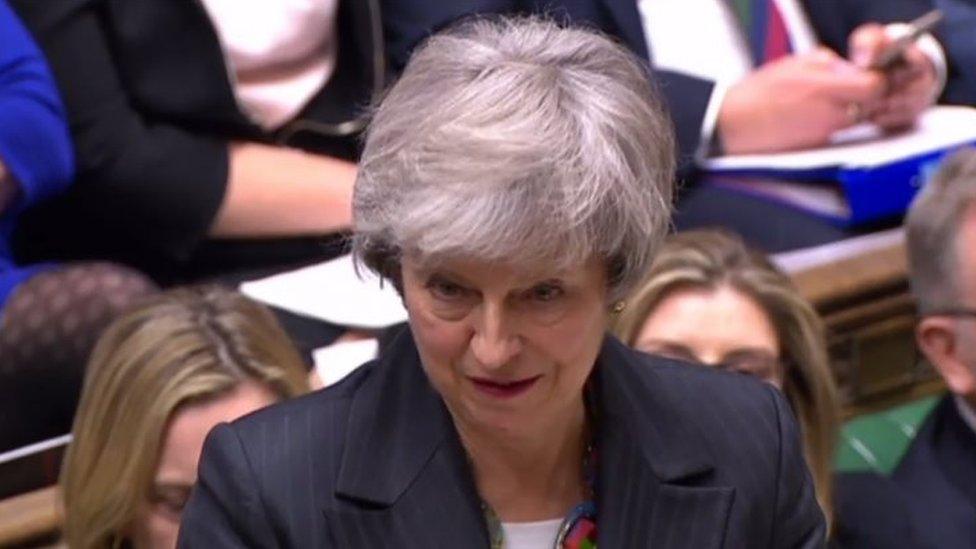Brexit: Will Theresa May delay MPs' vote to last minute?
- Published

As we talked about late on Monday, there has been a sense building in Westminster that the prime minister is, maybe by accident, maybe increasingly by design, looking to almost the last possible minute for the definitive Brexit vote.
While ministers speak publicly of "talks" that must be given time to be completed with the EU, and officials continue to chew over the possibility of the "Malthouse compromise" (remember that? It already seems like months ago that it emerged, blinking, into the Brexit saga) more and more MPs believe it is displacement activity - ministers keeping outwardly busy while they run down the clock.
Early on Tuesday morning, Commons leader Andrea Leadsom did not exactly quash that notion in an interview with the Today programme.
She appeared to open up the possibility that MPs might in the end be asked to vote at a moment of peak jeopardy, and that ministers might be willing to let the matter run that long.
Then, on Tuesday afternoon, the prime minister herself hinted that the government was prepared to do that.
She was answering a technical question about the CRAG (the constitutional reform and governance bill before you ask, Brexit is nothing if not replete with acronyms).
For ages, the existence of that bill has built a theoretical pause between a vote on the deal, and our actual departure from the EU.
But today the prime minister said that process could be put on fast forward.
So, in practice, if she wants to push this vote later, and later, then only to the very last minute (and remember the EU doesn't want to budge until then), that bit of legislation might not be a block, because if MPs approve it, she can get round it.
That's always a big if, of course, but it certainly suggests that the government can at least foresee a situation where they have to take dramatic last-minute action, whatever the existing law says.
What's also emerging though is how former Remainers want to stop that happening.
They won't be using up their energy this week on votes that might not get anywhere.
But their concerns have pushed the PM now to promise a vote will take place on 27 February.
And there will be another go from the prominent Labour frontbencher Yvette Cooper, working with backing from Tories like Sir Oliver Letwin and Nick Boles.
They will again try to force through legislation that would delay Brexit if the government can't get a deal done in time, removing the possibility of that last-minute kamikaze choice.
But that will only work if enough Tory Remainers are ready to vote with them.
And the way the numbers stack up, that probably has to mean ministers being ready to quit.
One member of the government told me on Tuesday: "They have to realise that is it - and if no senior member of the cabinet is willing to do it, then we're heading for that terrible choice."
Another minister, one of those who is thinking about departure, said: "I have to look the PM in the eye and ask what she is really willing to do. But for a number of us it's party versus country, and the Tories don't do well if we put ourselves before the public."
Some of those organising the push to take the March "deal or no deal" choice off the table believe there are at least 10 government ministers who would be ready to quit.
Maybe so.
On past evidence, ministers who see themselves as moderate and pragmatic hang back in the end.
But the end of February really does seem to be the last moment where they could do more to stop no deal than just pass a resolution the government could then ignore.
If they are not willing to give up their ministerial red boxes on 27 February, their chance really will have gone.